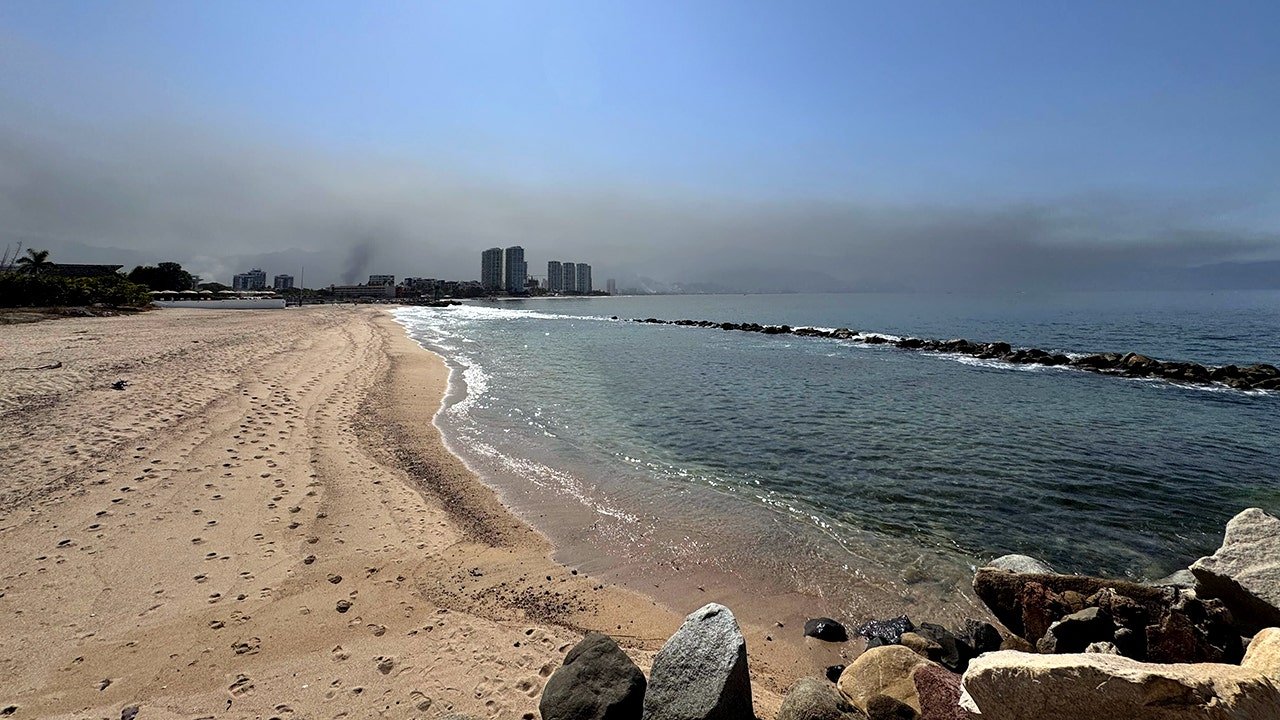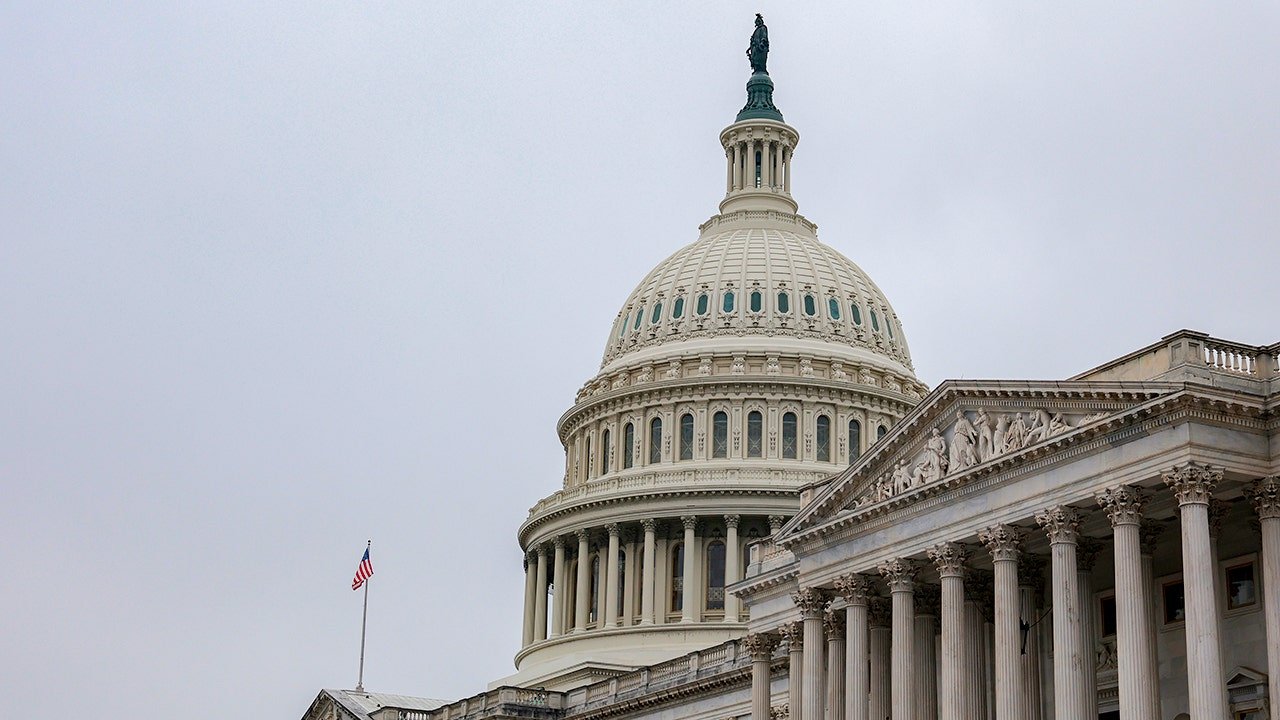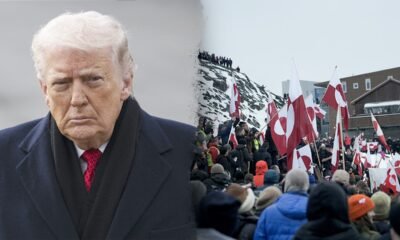INTERNACIONAL
Trump signs executive orders bolstering nuclear industry, domestic uranium mining

President Donald Trump signed several executive orders (EOs) on nuclear energy proliferation and an order removing political considerations from public-sector science, as conservatives claimed the latter was scandalized in its response to the COVID-19 pandemic.
Trump also signed restoring «gold standard science» as the cornerstone of federal research.
At the White House, Interior Secretary Doug Burgum said America led the postwar world on «all things nuclear» until we «stagnated» and «choked it with overregulation.»
«We’re going to have the lights on and AI operating when others are not because of our nuclear capabilities,» added Defense Secretary Pete Hegseth.
A senior White House official said on Friday there has been a decline in «disruptive research» and investments in biomedical research, along with «serious cases» of fraud and misconduct and the inability to reproduce scientific methods for the purpose of restoring public trust.
The official also blamed policy responses to the COVID-19 pandemic and «woke DEI initiatives» for endangering the public’s trust in government scientists.
CHINESE SOLAR TECH POSES CHILLING THREAT TO US ELECTRIC GRID, LAWMAKERS WARN
President Donald Trump is set to sign executive orders regarding nuclear energy. (Getty)
Now-retired NIAID Director Dr. Anthony Fauci was repeatedly denounced for flip-flopping and obfuscating during his time engineering the federal response to COVID-19, leading many particularly on the right to disregard and dismiss the legitimacy of federal health authorities outright.
That order cites the fact the Biden administration included political edits from teachers unions in school-reopening guidance, instead of leading with any scientific evidence.
The order will enforce «gold standard science,» defined as reproducible, transparent and falsifiable – as well as being subject to peer review and making sure that scientists are not discouraged from discovering outcomes that run counter to a narrative.
In terms of nuclear energy, one order will reform nuclear R&D at the Energy Department, accelerate reactor testing at national labs and establish a pilot program for new construction.
TRUMP ADMIN HITS BULLSEYE WITH FIRST US MINE FOR KEY MINERAL
Energy Secretary Chris Wright previously told Fox News Digital that revitalizing and highlighting the work of U.S. national labs is paramount to his agenda.
In a move that appears to support Wright’s push for nuclear power, Trump will sign an order aimed at advancing new reactor construction on public lands.
CHRIS WRIGHT CONFIRMED SECRETARY OF ENERGY
A senior White House official cited the importance of that type of reliable power-source for critical defense facilities and AI data centers.
Another order being signed Friday will overhaul the Nuclear Regulatory Commission (NRC) to require it to rule on reactor license applications within 18 months.
Only two new nuclear reactors have begun construction and entered into commercial operation since the Carter administration.
CLICK HERE TO GET THE FOX NEWS APP
A typically risk-averse culture that requires, for example, nuclear facilities to emit as little radiation as possible, including below naturally-occurring levels, which critics said has hindered the NRC from licensing new reactors as technology begets safer and cheaper means of production.
The orders will also seek to raise nuclear energy capacity from 100 gigawatts (GW) to 400 GW within 25 years.
Another order will establish a vision to mine and enrich uranium within the U.S., decreasing another avenue of foreign reliance – and «reinvigorate» the nuclear fuel cycle.
«That means America will start mining and enriching uranium and expanding domestic uranium conversion and enrichment capacity,» a senior White House official said.
Trump is expected to leverage the Defense Production Act – which last helped secure COVID-19 paraphernalia like masks and ventilators – to seek agreements with domestic nuclear energy companies for the procurement of enriched uranium, as well as finding ways to manage spent nuke fuel.
Nuclear energy, the White House said in the order, «is necessary to power the next generation technologies that secure our global industrial, digital, and economic dominance, achieve energy independence, and protect our national security.»
Joe Dominguez, of Constellation Energy; one of the stakeholders in the orders, said nuclear energy is a «24/7 resource.»
«These data centers run 24/7 00 some of them will cost $200-300 billion, …[so] we can’t use intermittent resources,» Dominguez said. «If you can’t get the plant on, you can’t get revenue.»
One of the orders also creates a special U.S. envoy for nuclear experts.
In the midst of applying his signature, Trump quipped, «could I use an auto-pen… what did Biden do?»
Politics,Science,US Energy,Anthony Fauci,White House,Donald Trump
INTERNACIONAL
Tourists in Mexican seaside city told to stay on resort as government warns of ‘clashes’

NEWYou can now listen to Fox News articles!
Tourists in the Mexican seaside city of Puerto Vallarta were told not to leave their resort on Sunday as a government official warned of «clashes» in the area following a federal operation.
Photos and video shared with Fox News Digital capture billowing, dark smoke clouding the skyline of the city, which is located on Mexico’s Pacific Coast in the state of Jalisco.
Tourists at a local resort told Fox News Digital that they were urged to stay put at the resort. They said no reason for exercising the caution was immediately given.
The U.S. State Department later issued a travel warning for multiple areas in Mexico on Sunday afternoon, urging U.S. citizens to shelter in place until further notice due to «ongoing security operations and related road blockages and criminal activity.»
US OFFICIALS WARN SNOWBIRDS OF ‘VIOLENT CRIME’ IN WINTER DESTINATION HOT SPOT
Smoke was seen rising into the skies of Puerto Vallarta in Mexico’s Jalisco state on Sunday, Feb. 22, 2026. (Obtained by Fox News Digital)
The travel warning was issued for parts of Jalisco state, including Puerto Vallarta, Chapala and Guadalajara; Tamaulipas state, including Reynosa and other municipalities; and areas of Michoacan state, Guerrero state and Nuevo Leon state.
Jalisco Gov. Pablo Lemus Navarro announced in a post on X that federal forces carried out an «operation» in the town of Tapalpa earlier Sunday, which led to «clashes» in the area.
«Also as a result of said operation, in various points of that region and in other parts of Jalisco, individuals have burned and blocked vehicles with the aim of hindering the actions of the authorities,» Navarro wrote in the post in Spanish.
In multiple posts, Navarro wrote that «the violent incidents have spread» and «blockades have shifted» as the government and law enforcement work to safeguard citizens.
ALLEGED SINALOA CARTEL FENTANYL PRODUCER CHARGED IN NEWLY UNSEALED FEDERAL INDICTMENT
Navarro added that the government has enacted a «Code Red» to keep the public safe.

Tourists said they were told not to leave their resort in Puerto Vallarta on Sunday. (Obtained by Fox News Digital)
«We reiterate the recommendation to avoid leaving your homes,» Navarro wrote in a second post. «The clashes are occurring in several federal entities.»
CLICK HERE TO DOWNLOAD THE FOX NEWS APP
While government officials did not immediately provide details about the federal operation, local news outlets report that the operation may have involved the Jalisco New Generation cartel and one of its notorious leaders, Nemesio «El Mencho» Oseguera Cervantes.
location mexico,puerto vallarta,mexican cartel violence,world
INTERNACIONAL
La historia de “El Mencho”: cómo el líder del CJNG se convirtió en uno de los narcotraficantes más buscados en el mundo

Nemesio Oseguera Cervantes, teniendo más de 50 año de edad, llegó a la cumbre de su carrera criminal. Identificado como líder del Cártel Jalisco Nueva Generación, Oseguera, conocido como El Mencho se convirtió en el hombre más buscado de México y Estados Unidos.
Es el segundo mexicano más buscado por Estados Unidos. El primero es Rafael Caro Quintero, El Narco de Narcos, por el asesinato de Enrique Kiki Camarena, ex agente de la DEA (Administración de Control de Drogas, por sus siglas en inglés) de EEUU. Pero inmediatamente después, en la lista de los más buscados, figura el rostro de Nemesio Oseguera, El Mencho, líder del CJNG.
La historia de Oseguera Cervantes es extraordinaria porque la gran mayoría de narcos mexicanos de su generación han sido apresados o han muerto violentamente.
Según la acusación del Departamento de Justicia de EEUU, El Mencho dirigió el CJNG ―o su versión embrionaria― al menos desde el año 2000 y logró expandirlo a la mayoría de los estados de México y a varias ciudades de los Estados Unidos. Sus primeros pasos en el narco los dio, sin embargo, bastante antes.

En Naranjo de Chila ―un pueblo al sureste de Michoacán― nació el 17 de julio de 1966 Nemesio Oseguera Cervantes, uno de los seis hermanos de una familia de productores de aguacate.
Dicen que lo bautizaron con el nombre de Rubén y él se hizo llamar Nemesio en honor a su padrino. También que su cuna es el municipio de Naranjo de Chila y otros que fue Uruapan o Aguililla. Tal vez fue este último porque allí, apenas siendo un niño que recién abandonaba la escuela en el quinto año de primaria, se contrató para cuidar los campos de aguacate, propiedad de los Valencia.
De esta familia, conocida primero como el Cártel del Aguacate (porque traficaba la marihuana escondida en los cargamentos de ese fruto), nació el Cártel del Milenio cuando saltaron a la siembra de marihuana y amapola. Tan poderosos eran en su tierra que uno de ellos, José, incluso llegó a alcalde en 1989, postulado por el PRD. Con ellos, apenas adolescente, El Mencho se hizo vigilante de los plantíos y traficante después.

Sin embargo, debió haber soñado con algo más que aguacates, porque en pocos años empacó y se mudó al norte de California, Estados Unidos.
A los 20 años, para 1986, ya había emigrado a Estados Unidos. Vivía en la bahía de San Francisco, en California, donde se involucró con una banda de tráfico de heroína y metanfetamina e intentó construir una red de clientes como dealer. El periodista estadounidense Josh Eells, en un reportaje publicado en la revista Rolling Stone y con base en información de autoridades de Estados Unidos, afirma que Abigael González Valencia, El Cuini, cuñado de Oseguera Cervantes, lo formó en el negocio de las drogas.
Fue detenido en 1986 cuando él y su hermano mayor, Abraham Oseguera, vendieron heroína a dos policías encubiertos; en 1992 fueron enviados a una prisión federal y luego deportados. Una foto de reserva del incidente muestra al Mencho, de 19 años, con una sudadera con capucha y con acné en la cara.
Dos meses después, nació su primer hija: Jessica Johanna Oseguera.
Al salir de prisión, en 1997, se enroló como policía municipal en Tomatlán, Jalisco. Allí se vinculó con los hermanos Nava Valencia del Cártel del Milenio, y con Nacho Coronel, del Cártel del Pacífico, como también llamaban a la organización criminal del Chapo Guzmán.
Con ellos, al dejar la policía, El Mencho se convirtió en una especie de consejero de seguridad y una pieza estratégica en el tráfico de drogas sintéticas a Estados Unidos gracias a su experiencia en aquel país, de acuerdo con Eells.
Desde la formación del CJNG en 2011, El Mencho pronto logró expandirse en casi todo México y tiene presencia internacional en Estados Unidos, Colombia y, sin confirmar, en Canadá, Argentina, Holanda, Ghana, Nigeria, Marruecos, Rusia, China, Corea del Sur, Alemania, Perú, Centroamérica, Bolivia, Malasia, Indonesia, Vietnam, Polonia, Australia, y Camboya, con lo que habría superado en 2018 al Cártel de Sinaloa en el tráfico de alucinógenos, de acuerdo con diversos reportes.

Oseguera Cervantes supuestamente se escondía en las montañas de Jalisco y, según la prensa local, padece insuficiencia renal, un mal que lo mantenía con diálisis y atado a una cama, por lo que la organización sería dirigida por sus lugartenientes.
En febrero de 2020, los gobiernos de México y de EEUU dieron un golpe al criminal cuando el hijo del Mencho, Rubén Oseguera González, El Menchito, fue extraditado, y su hija, Jessica Johanna Oseguera González, fue detenida mientras acudía a una de las audiencias de su hermano.
INTERNACIONAL
Why keeping lawmakers in DC during shutdown may have caused more harm than good

NEWYou can now listen to Fox News articles!
«I can’t believe they just left!»
«Why didn’t they just stay until they fixed it?»
«Why didn’t they make them stay?»
I must have fielded forty questions last week from colleagues, friends and acquaintances. Even reporters and editorial staff from other news organizations. And that’s to say nothing of a few Congressional aides.
Everyone had the same question. They were in disbelief that lawmakers just abandoned the Capitol a week ago Thursday and left the Department of Homeland Security without funding on Saturday at 12:00:01 am et.
COAST GUARD CAUGHT AS ‘COLLATERAL DAMAGE’ IN DEMOCRATS’ DHS SHUTDOWN AS CHINA, RUSSIA PRESS US WATERS
Senate Democrats blocked a short-term funding bill, stalling efforts to keep DHS and its agencies operating. (Photo by Heather Diehl/Getty Images)
The Senate tried twice to avert the partial government shutdown on Thursday. The Senate failed to break a filibuster on a placeholder, undetermined funding bill. And then Sen. Chris Murphy, D-Conn., objected to a request by Sen. Katie Britt, R-Ala., to approve a stopgap, two-week funding bill. Passage of the bill would require agreement of all 100 senators. But all it took was one objection. And Murphy, speaking for many Democrats on both sides of the Capitol, interceded to sidetrack Britt’s effort.
«I’m over it!» shouted an exasperated Britt on the Senate floor, as Congress pitched at least part of the federal government into its third shutdown since October 1.
Democrats are refusing to fund the Department of Homeland Security until there’s a specific agreement to reform U.S. Immigration and Customs Enforcement (ICE). And – few Democrats will say this out loud – but their base insists on Democrats shuttering DHS over ICE tactics after the killings of Renee Good and Alex Pretti in Minneapolis.
This is somewhat ironic. Republicans funded ICE through 2029 via last year’s One, Big, Beautiful Bill. So thanks to Democrats, TSA, the Coast Guard and FEMA – all under the DHS aegis – are without money right now. That means tens of thousands of employees are technically working without paychecks as they scan passengers at airports, patrol the seas and respond to natural disasters.
This brings us back to the basic question: Why didn’t they just stay until they figured it out?
As a reporter, I have covered dozens of shutdowns, partial shutdowns, near shutdowns, flirtations with shutdowns. That’s to say nothing of various permutations of interim spending bills – long and short – known as Continuing Resolutions or CRs. Those bills keep the funding flowing at the old spending level – until lawmakers all agree on something new. Sometimes one CR begets another CR. And even another one after that until everything’s resolved. The exercise can go on for months.
HOW ICE WENT FROM POST-9/11 COUNTERTERROR AGENCY TO CENTER OF THE IMMIGRATION FIGHT

Sen. Katie Britt vented frustration on the Senate floor after her stopgap bill was blocked. (Photo by Anna Moneymaker/Getty Images)
But as it pertains to DHS, lawmakers weren’t going to solve the issues surrounding ICE right away. So both the House and Senate got out of Dodge last Thursday as the deadline loomed. Lawmakers were everywhere from the Middle East to Munich when the bell tolled midnight Saturday and DHS lumbered into a slow-speed funding crash.
Failure to fund the Department of Homeland Security may seem unreasonable from a policy standpoint – regardless of what you think of ICE. But it’s not unreasonable if you understand the politics and Congressional procedure to fund ICE.
Let’s say they were on the precipice of an agreement to fund DHS. That may involve some last-minute trading of paper between Senate and House leaders. Maybe a call or two from the President to reluctant Republicans. If lawmakers believed a deal was within range, it’s doubtful that leaders would have cut Members loose. They would have stayed if there was a viable path to nail something down last Friday, have the Senate expedite the process and vote on either Saturday or Sunday (albeit after the deadline) and then have the House vote on Monday. That’s all under the premise of a deal being close.
They were nowhere near that stage when lawmakers called it last Thursday. Democrats didn’t send over their offer for days after a brief shutdown of 78 percent of the government more than two weeks ago. Democrats then criticized Republicans and the White House for slowly volleying a counteroffer. Democrats then rejected the GOP plan – only sending back another plan late Monday.
Getting a deal which can pass both the House and Senate – and overcome a Senate filibuster – takes time. And there simply wasn’t a deal to be had yet.
This is where things get really interesting. With no agreement in sight, you simply don’t anchor lawmakers in Washington with nothing to do. There’s nothing to vote on. There are no committee meetings scheduled. All tethering lawmakers to DC does is stir up trouble.
There’s a line in the song «Trouble» in The Music Man by Meredith Willson: «The idle brain is the devil’s playground.» Who knows what kinds of mischief you would have, just making very cranky lawmakers hang around Washington for days – without anything to vote on. Keeping everyone here does not contribute to securing a deal. Yes, all 532 House and Senate Members (there are two House vacancies) must eventually be dialed-in to vote on a bill to fund DHS. But we aren’t there yet. A handful of Members in the House, Senate and people at the White House will be the ones to negotiate an agreement. Rank-and-file Members marooned in Washington with nothing to do but post outrageous things on social media and appear on cable TV is counterproductive.
Now, let’s look at the other scenario of being close to an agreement. House and Senate leaders may believe they are still a little short of votes. But if something is viable, leaders know they can nail down the votes with some arm-twisting, legislative and ego massaging and a few forceful phone calls. Yes, that process may require elbow grease. But in that instance, keeping everyone in Washington for a few extra days and blowing up a long-awaited Congressional recess actually helps the process.
DHS SHUTDOWN LEAVES LOCAL EMERGENCY RESPONDERS ON THEIR OWN AMID EXTREME WEATHER, EXPERT WARNS

TSA officers, Coast Guard members and FEMA staff are working without pay as the DHS funding lapse drags on. (Photo by Heather Diehl/Getty Images)
Why?
Think of the Stockholm Syndrome. You demand that everyone stay in Washington for an extra day or two and the «hostages» will start to come around to the viewpoints of their captors. Yes, everyone is frustrated and mad. But they feel the bill is something they can support and finally end this triumvirate of government shutdowns. In this case, the fustigation builds – but just a little. Everyone is happy to vote yes and rush off of Capitol Hill.
If they were close to nailing down an agreement on DHS funding, then Congressional leaders would have deployed a version of the Stockholm Syndrome to wrap up everything.
CLICK HERE TO DOWNLOAD THE FOX NEWS APP
But with no deal, leaders were more afraid of the mayhem they may trigger by keeping everyone in Washington. The devil would romp freely through the playground of idle brains.
So how will you know when there’s a deal?
When everyone’s present and accounted for.
government shutdown,budget senate,democrats senate,homeland security

 CHIMENTOS3 días ago
CHIMENTOS3 días agoEscándalo en MasterChef: una famosa abandonó a los gritos y acusando que está todo arreglado

 POLITICA3 días ago
POLITICA3 días agoDel himno peronista de Kelly Olmos al exabrupto de Agustina Propato: las perlitas del debate por la reforma laboral

 ECONOMIA1 día ago
ECONOMIA1 día agoVillarruel cuestionó la apertura de importaciones: «Sin industria, se pasa a depender de China»

























